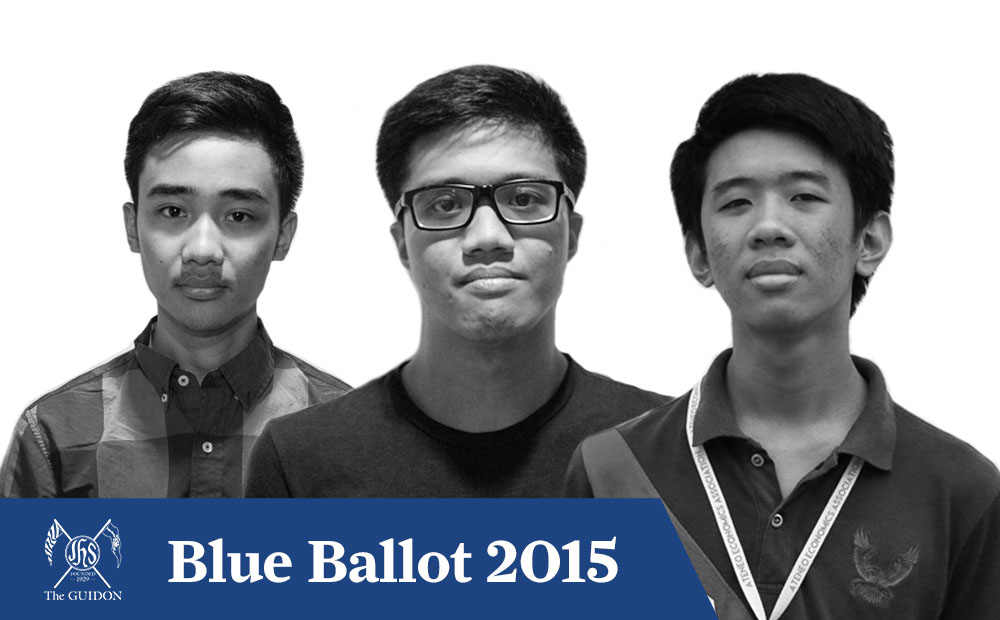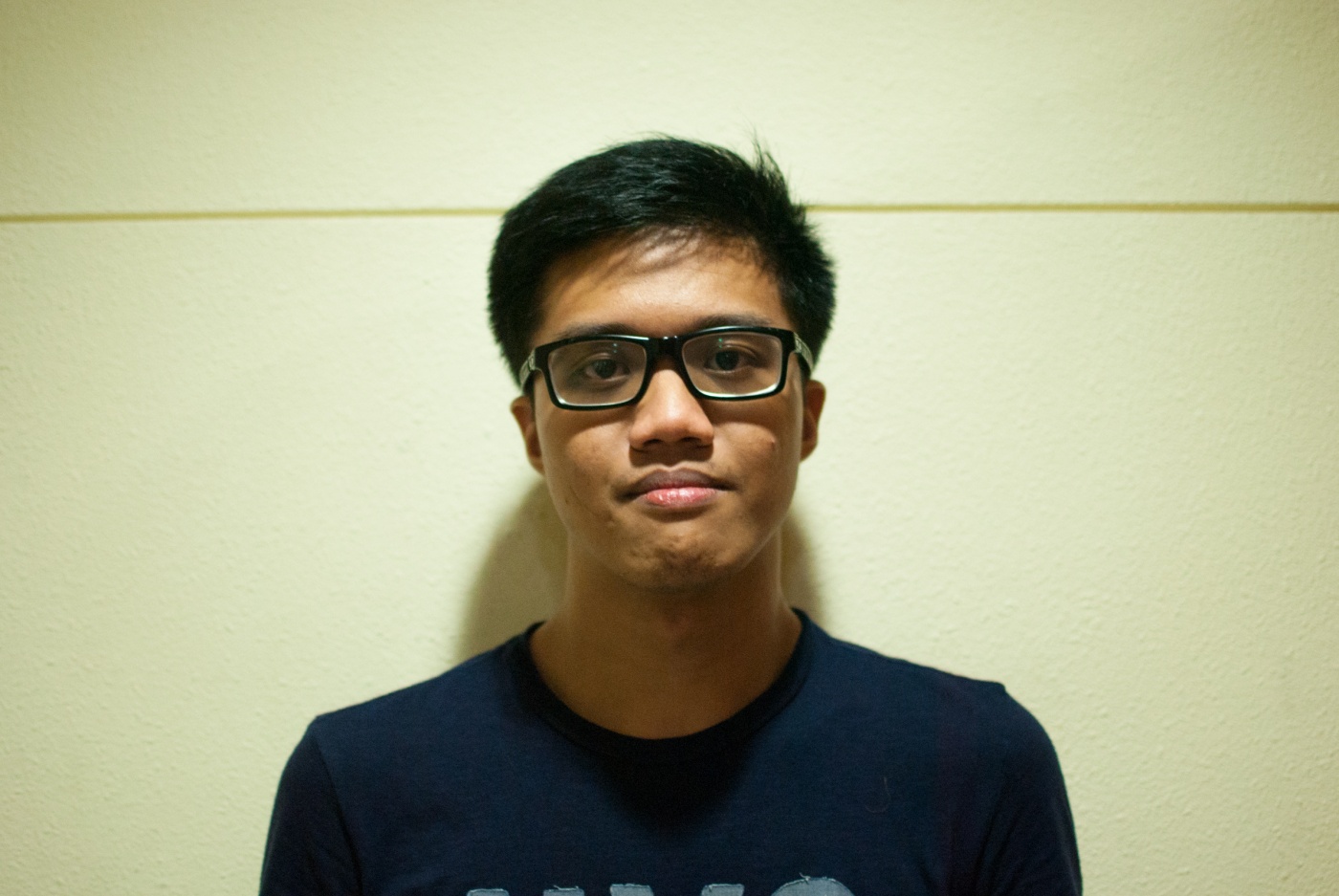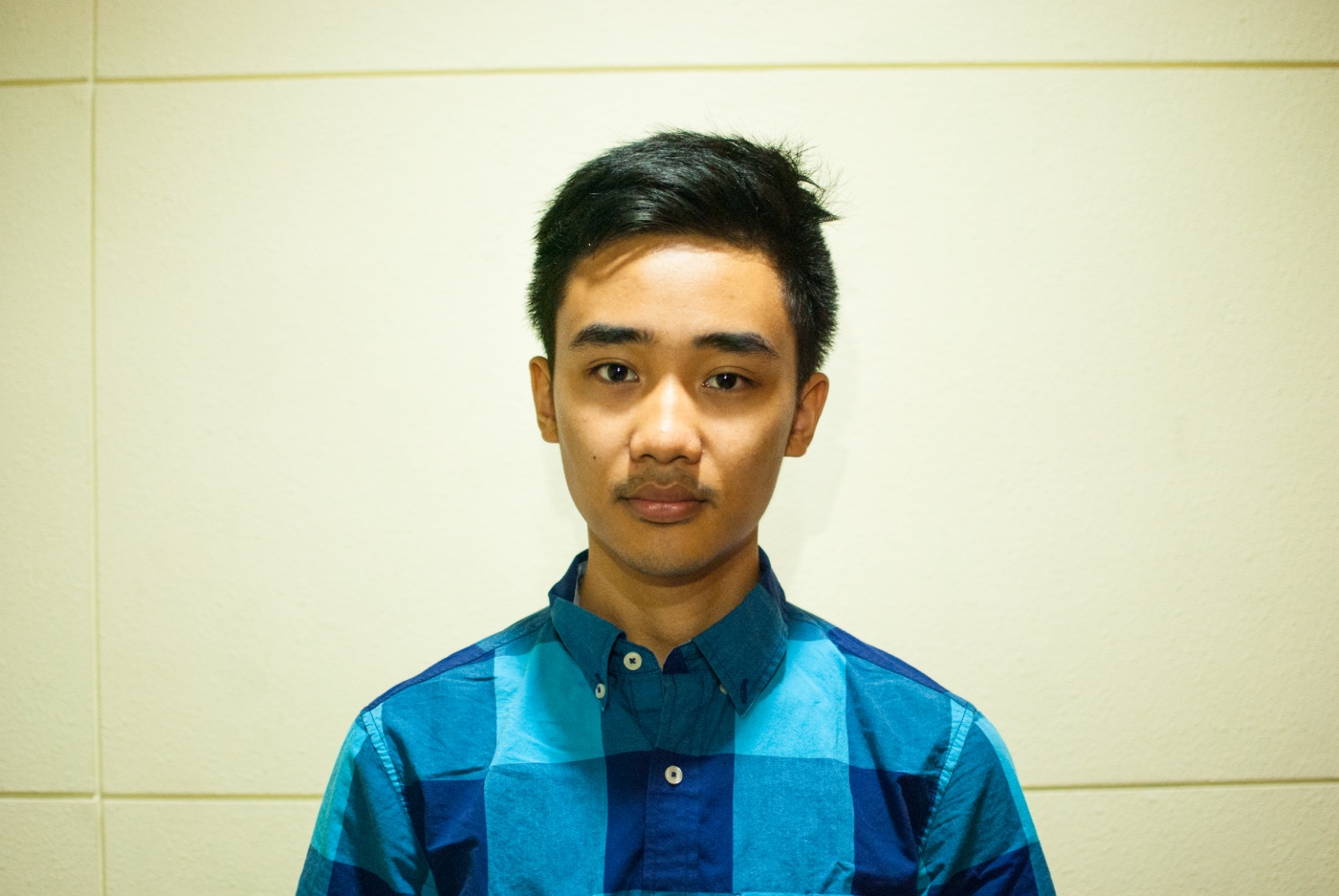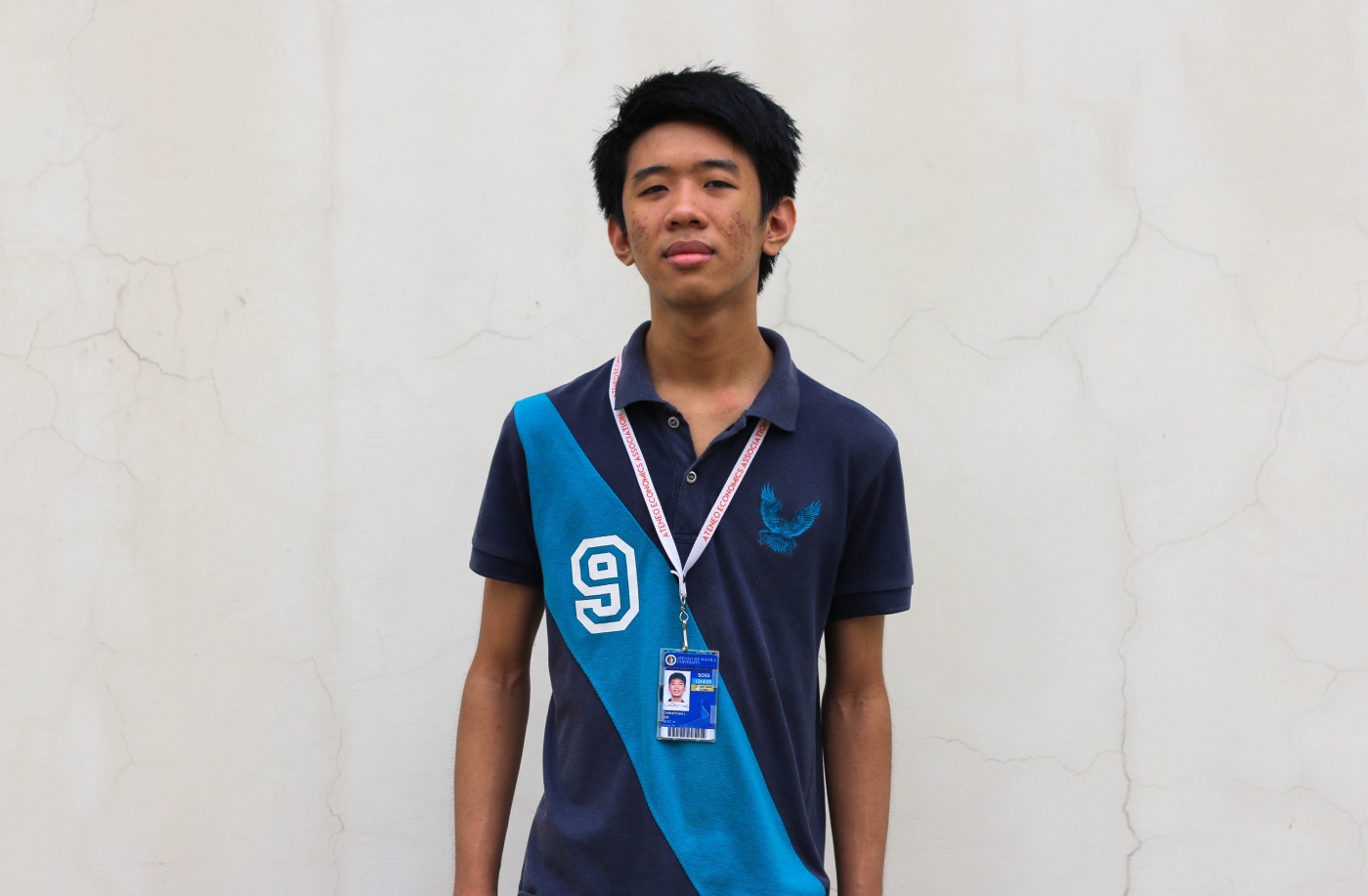Mawe Duque: Vice President
While most of us would write off a loss for what it is, management engineering senior Mawe Duque sees it as another opportunity. Despite not reaching quota in last year’s General Elections, the Ateneo Task Force (ATF) 2016 co-head is once again running for a position in this year’s Sanggunian, as the lone vice presidential candidate.
Duque believes that despite the 120-plus deficiency in last year’s election results, he is still compelled to lead the Ateneo’s student government. “I believe that people believed in my platform, that people believed in my skills to lead the Sanggunian, and that’s one of my reasons for running again,” he says.
He claims that these skills are reflected in his track record as last year’s John Gokongwei School of Management junior Central Board (CB) representative. Duque was able to pass three resolutions during his term, as well as work on the tricycle fare matrix.
“I believe that through my position last year, I actualized the real responsibility of Sanggunian, which is policymaking,” Duque states.
This policymaking responsibility is seen in Duque’s platform this year, as he wants to pass five priority resolutions during his term. The first is a more clear involvement of course and block representatives in the legislative function of the Sanggunian. “We need these front liners, the representatives of the different blocks and courses, the grassroots participation to be involved in policymaking,” Duque explains.
Duque also wants to strictly enforce the disclosure and dissemination of information from CB meetings and committees.
He wants clear election reforms as well, through the creation of a campaign subsidy system. This subsidy system will not just be for political parties but also for candidates who are financial aid scholars. Duque believes that because election paraphernalia comes directly from candidates’ pockets, it is one of the reasons why “elections [are] not very vibrant this year.”
Due to this year’s academic calendar shift, Duque wants to create a Committee on International Student Affairs. “There needs to be a committee in the Sanggunian that will reflect hand-in-hand with the [Office of International Relations] in order for us to acknowledge that there may be student concerns arising from the expected increase of foreign students in school,” he says.
Finally, the one thing that Duque is most excited about in his platform is the creation of a Youth Transport Coalition in the Ateneo. “Come November, we’re expected that the traffic situation will get worse because of the road reconstruction, road widening, road infrastructure, road happenings whatsoever,” he explains. “One of the things that we have to consider is there should be a platform where public commuters and private drivers, students and faculty can air out their concerns.”
The Youth Transport Coalition will serve not only as a platform for students and faculty, but also as a mobilization effort. Duque hopes that by asking commuters and private drivers about their transportation concerns, it can become an agenda point for the 2016 National Elections.
This focus on internal reforms as well as external key issues is why Duque and his fellow running mates, Christian Dy and Lanz Espacio, have settled on the tagline “Handang Tumugon.”
According to Duque, the tagline has two meanings. “Handa means you’re ready internally and tumugon is you’re ready to respond both to internal and external matters.”
“We need to respond to both internal concerns, student concerns, administrative concerns, student rights, and externally to national issues, like transportation, agrarian reform, things like that,” he adds.
For Lyka Aguilar, Duque’s co-worker in ATF, Duque “strikes the perfect balance between being excited and proud of his work and at the same time is constantly worried and anxious about it.” She says that despite his shortcomings, he is still able to look at the bigger picture.
Duque knows that this year will be difficult for the Sanggunian, considering the past few years’ failure of elections, but it’s a challenge he’s ready and willing to take. “Student mobilization, political participation, providing students basic services—that’s our way to nation building,” he says.
Report from Roxie Y. Ramirez.
Lanz Espacio: Secretary-General
“Matagal ko nang gustong maging part ng Sanggunian (I have wanted to be a part of the Sanggunian for quite some time now),” says Lanz Espacio, the sole candidate for the position of Sanggunian secretary-general this school year. The development studies junior recalls how he had run and lost for a John Gokongwei School of Management Central Board (CB) position in both his first and second year in the Loyola Schools (LS). While such a succession of attempts would no doubt discourage the ordinary student, these experiences were not enough to dampen his drive to serve.
Currently the co-head of the Ateneo Task Force (ATF) 2016, Espacio has hopes in a Sanggunian that also mobilizes Ateneans to participate in political exercises. “We need to move towards this direction, which is political development,” he asserts. The ATF is the Ateneo’s official student group responsible for integrating the school’s efforts with next year’s national elections.
Espacio is also the secretary-general of the Ateneans for Agrarian Reform Movement (AFARM), an unaccredited student organization that advocates for the welfare of farmers in the country. This outward engagement towards different groups is reflected in his platform on striving for a more political student government, as it is centered on both public relations and external affairs.
Under public relations, he plans to streamline the efforts of the Office of the Secretary-General with the Sanggunian’s Department of Public Relations. This entails developing communication strategies with the Sanggunian’s constituents through their different media channels. Ultimately, this is tied to making the office’s internal systems more efficient and transparent. “We’re trying to brand the Sanggunian as a political institution,” he says.
On the other hand, his point on external affairs involves the development, on the Sanggunian’s end, of partnerships with sector groups and marginalized groups both inside and outside the university. This includes external cooperatives, labor unions, and non-government organizations, among others. Hand-in-hand with this will be the establishment of a CB committee that will effectively enable the Sanggunian to release stands that protect such organizations. “I see these groups as an opportunity for us to have an environment conducive for political discourse,” he explains.
Ultimately however, Espacio has a vision on making the Sanggunian “more open” to its constituents. He thinks that this, in turn, will assert its relevance as a political institution given the recent school years in the LS which saw the failure of a striking number of candidates to be elected into position. “Together with Mawe [Duque] and Christian [Dy], we’re forwarding a campaign that is consultative,” he says. “That kind of campaign, that culture of reaching out to our constituency—personally, that’s what I want to do.”
CJ Leong, a co-worker of Lance under ATF, affirms Espacio’s capability for the position. She describes him as both a fearless speaker and a silent worker—the former referring to his confidence in speaking up no matter the circumstance, and the latter referring to how Espacio consistently delivers his work even if he “may not be very loud and directive within the group.”
She thinks that out of the four top positions in the Sanggunian, the role of the secretary-general is the most demanding as it entails a comprehensive job of coordination, internal troubleshooting, and communication.
Alecs Reasonda, Espacio’s partymate from the Christian Union for Socialist and Democratic Advancement and his co-worker in AFARM, agrees with how crucial the role is. “[Espacio] has to be consistent, and he has to let the students know what Sanggunian is doing—so that the students [will] understand why Sanggunian as an institution exists in the first place,” she says. However, she trusts him as well in that regard: “I think he can do a good job, since he is very serious with his responsibilities, and more notably, he’s consistent.”
Leong has known Espacio for two years now, and attests to his consistency as a form of perseverance. “Lanz has been running for Sanggu for three consecutive years now,” she says. “Despite losing the first two, nagtataya pa rin si Lanz sa Sanggunian (Despite losing the first two, Lanz still believes in the Sanggunian).”
Report by Benny G. Tañedo.
Christian Dy: Finance Officer
Economics junior Christian Dy smiles, sits on the bench, and, with hands clasped and his feet firmly planted on the floor, straightens his back and prepares for the first question. He arrived at the interview venue several minutes in advance, ready to defend his vision for the Sanggunian and the Ateneo student body.
“In general, most candidates don’t really take time frames seriously,” he later on explains, as he discusses his plans as finance officer (FO). Dy, the sole candidate for the position in this academic year’s Special Elections, puts emphasis on time as well as resources in both his electoral platform and his own socio-political beliefs.
While acting as then School of Social Sciences (SOSS) Secretary Treasurer Mikee Defensor’s chief-of-staff, Dy ran for the position of SOSS junior Central Board (CB) representative in last academic year’s General Elections but did not reach quota.
He also functioned as head of sociopolitical affairs in the Ateneo Resident Students Association (ARSA) Aguhon, the social responsibility arm of ARSA. He now works as the chairman of the Sanggunian Committee on Socio-political Advocacy.
Dy believes in the ability of resources “to make things happen” and to “empower students in their advocacy,” which is why he continues to participate, support, and lead movements for social change—social change that is forwarded and grounded by what Dy calls “moral conviction.”
However, moral conviction can only do so much. According to him, the current state of the Sanggunian and its inability to “fully [do] projects and programs” contributed to the particular sense of urgency he felt to run for FO.
“The Sanggunian is not an independent institution, it’s not a genuine student government,” Dy explains, “You [have] a student government in everything except where it should matter.” This lack of faith students have in the Sanggunian can supposedly be credited to the common notion that the institution has no real power.
The first thing Dy would like to do as FO is negotiate financial independence with the Office of Student Activities, considering he believes that “priorities are set by the amount of money invested in them.”
He would also like to create the Department of the Student Advocate, “which will essentially be the department of the Sanggunian fighting for students’ rights.” Dy believes that this will also contribute to the student body’s faith in the Sanggunian.
This faith in the Sanggunian is allegedly one he has harbored since he first enrolled in the Ateneo. Defensor says, “From the beginning, he was already aspiring to be in the Sanggunian.” She explains that even after he lost last academic year’s General Elections and he was technically “outside the Sanggunian,” he was still able to influence the institution. “Lahat niyon natupad niya kahit wala siya sa Sanggunian, what more kung nanalo siya (He was able to accomplish all of that even if he wasn’t in the Sanggunian, what more if he had actually won)?”
Dy’s current platform now features a time frame corresponding to each of his objectives, considering that he would like to increase the sense of accountability within the Sanggunian and between the Sanggunian and its constituents.
His platform is divided into five subheads expounding on projects concerning internal reform, investment in Ateneans (such as increasing support for student organizations), investment in people (such as the promotion of cooperatives as an alternative business model), the protection of student rights, and immediate needs (such as the need for petty cash loans).
“The Sanggunian I envision… is essentially investing in Ateneans because we know that Ateneans will invest in society,” Dy explains.
He also hopes that his own constituents will hold him accountable for his plans and promises. “I’ve been telling my constituents that if I don’t get the Department of Finance or the Department of the Student Advocate, I’m going to resign,” he says.
To Dy, the Sanggunian is capable of “[making] things happen,” but the best way to do that is for its constituents to make a statement—statements manifested in the polls. He advises everyone to “stand up, express yourself, and vote.”
“At a time like this… when the Sanggunian is at its least political,” Defensor says, “We need people like Christian Dy.”
Report by Alex A. Bichara.










